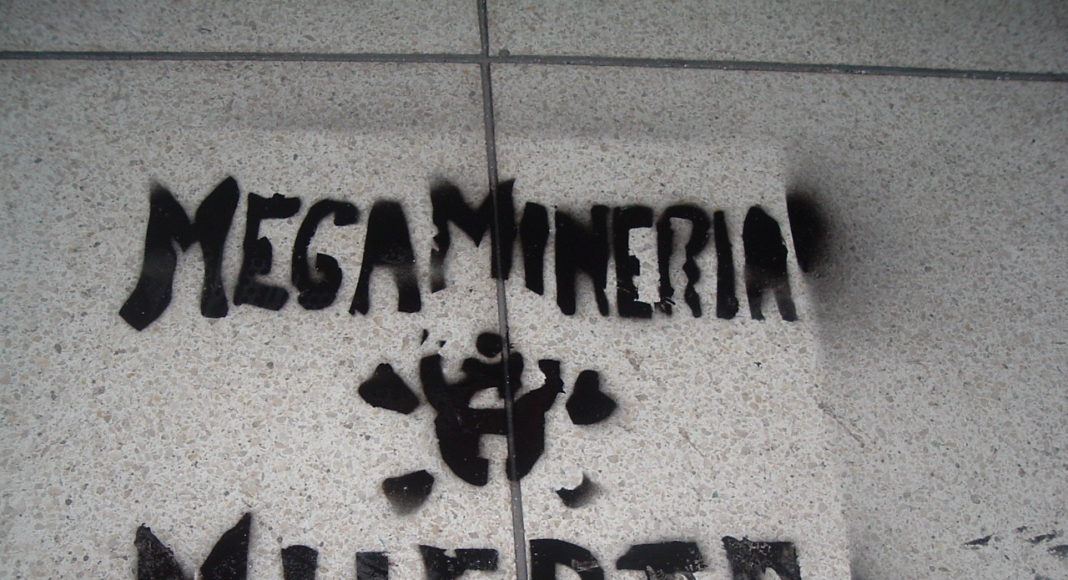Mining in Latin America is having harmful effects not only on the environment but for many of the people who live in nearby communities and their livestock. Three women from Latin America sit nervously and look exhausted in the Amnesty International headquarters. They are about to address an anxious crowd of twenty people, amongst whom are journalists and representatives from various organisations. The women from Peru, Venezuela and Guatemala spoke out about the effects mining has had on them and their countries, as they come to the close of a two-week European tour to publicise their cause.
Margarita Anchiraica (Peru)
 Margarita lives in Glorieta de Mayoc, a village 80km east of Lima and her problems first began in 1998, when a mining company began digging near her community. First reactions were positive and the community supported the mine. But things took a turn for the worse when the mining site turned into a dump.
Margarita lives in Glorieta de Mayoc, a village 80km east of Lima and her problems first began in 1998, when a mining company began digging near her community. First reactions were positive and the community supported the mine. But things took a turn for the worse when the mining site turned into a dump.
Margarita felt lied to and cheated. She said, “the mining company covered the area with yellow dust, which has harmed my lungs and kidneys. All the children got covered in rashes and had stomach aches. The livestock too were harmed. Everything went to hell.”
From this moment, Margarita began her battle against the company, the government and her community. Her community have shunned her and accused her of being against them and the mining company.
In 2003, she made a formal complaint to the Human Rights Commission of American States and it was upheld. Her complaint will take a further ten years to be resolved. Subsequently, in 2006 the mining firm was bought by a Canadian company, who are continuing to work the site illegally. Work came to an abrupt halt in 2008 due to instability but then began again in 2009.
Margarita said “the years go by and I achieve nothing. We need to save our planet.” She will continue to pursue the company so that she and her community get compensation.
Maria Eliza Orozco (Guatemala)
Maria has had a similar battle against mining and hydroelectric projects in her village in Guatemala. She rejects the intrusion of mining companies onto their land and into their community, as she believes they are “responsible for suppressing our struggle and being concerned only for the welfare of the company.”
“So what are they mining for? It’s all for gold and silver”. Maria pleads with the audience “to please stop buying gold.” If the global demand for gold decreases, then its value also will decrease, reducing the level of viable mining to the minimum.
In Guatemala there is an official process to request a licence to mine, but many firms have already started up illegally.
The arrival of a new president, President Otto Perez Molina in 2011, will not help, Maria believes: “He is a military man ready to strike against any struggle. The mining licence goes hand in hand with the military presence.”
What does Maria hope to achieve for Guatemala? She believes that the people need to strengthen their own capacity, which in turn will help them to hold more non-violent protests and avoid any conflicts.
She also wants amendments to be made to the mining legislation, so that there is more regulation.
Zenaida Romero (Venezuela)
Zenaida has a passion for public speaking, which can be seen by the ease with which she uses the microphone. She speaks with natural fluency, as she makes her mark on the audience.
Zenaida describes the coal mining affecting her people, the Yukpa people, and the indigenous communities.
The mining is supported by the Venezuelan president Hugo Chavez, whose government plans to increase coal mining in Zaila. There is a lot of political discourse and tension here: In the past Chavez spoke out often on Venezuelan television against illegal mining and of being for his people, but Zenaida doesn’t trust him. She believes he has personal interests linked to financial gain. It has now been 4 years since Chavez last spoke to Venezuela about the mining issues: “I think this is a president who likes to talk, but I want to remind him of his promises.”
Zenaida was unaware of the similar issues and struggles present in many Latin American countries. In the course of her European tour she has found “solidarity, because women are the defenders of human rights.”
Zeanida is the leader within her community and she plans on organising a campaign so that their rights can be upheld: “We don’t want mining contamination.”
These women are great fighters for human rights and for their beliefs and communities. They will not stop until they get justice and their tenacity is admirable. With little or no political backing from anyone nationally or internationally, they are striving to make their mark. Their European tour will give them an international voice. Let’s hope their campaign for change is successful.

